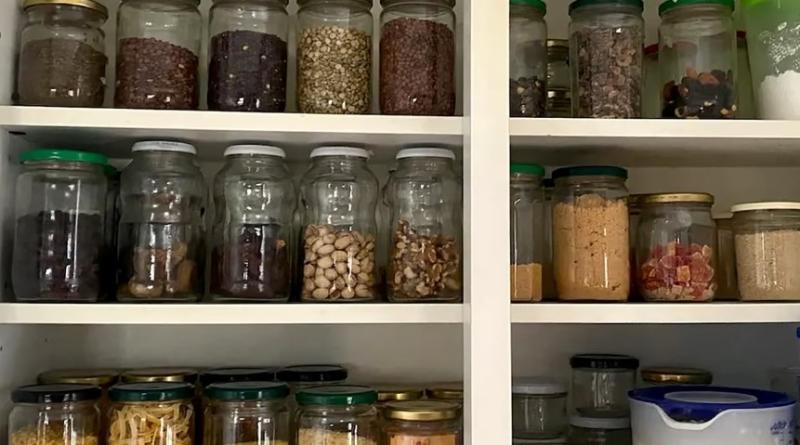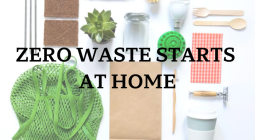‘It’s kind of gross but we can do it’: How a community learned to go zero waste

When Alexandre Garcin dreamed up Zero-Waste Roubaix, it wasn’t sustainability he wanted to tackle, but the litter problem that plagued his city. In the middle of his campaign to become a city councillor, Garcin’s brainwave was simple: rather than cleaning up more and more trash off the city’s streets, why not produce less garbage in the first place?
After he’d won, Garcin sent out leaflets looking for 100 volunteers to participate in a free, year-long pilot programme that would teach them how to live waste-free – or, at least with less waste than usual. These familles zéro déchet, or zero-waste families, would receive training and attend workshops on topics such as making your own yoghurt and cleaning with homemade products, with the goal of halving their waste by the year’s end. Volunteers weren’t offered any direct financial incentives to participate – only the promise of helping solve the litter problem and protecting the environment.
Using a luggage scale – a “really, really, really important” part of the programme, according to Garcin – they would periodically weigh their weekly trash and report it back to the city. The luggage scale forced people to recognise the impact, and literal weight, of their consumption choices, Garcin explained. “Physically, you have the sense of how heavy it is.”
The project came against a national backdrop of intensive waste reduction. France has passed some of the developed world’s most ambitious waste-reduction policies; it was the first country in the world to ban supermarkets from throwing away unsold food, and one of the first to enshrine “extended producer responsibility” into law, making big polluters financially responsible for the waste they create, even after their items are sold.
In 2020, France passed a landmark anti-waste law that banned clothing companies from destroying unsold merchandise, required all public buildings to install water fountains, and proposed “repairability index” labels for certain electronic products.
The benefits, proponents argue, could be huge; cutting waste could boost biodiversity and improve food systems. One estimate reckons that a comprehensive strategy which includes better material sorting, more recycling and source reduction could reduce waste-sector greenhouse emissions by 84% globally.
The Roubaix programme took what behavioural scientists call an “information-based” approach to change which builds understanding and awareness through unambiguous instructions, forums, meetings, training and feedback. The project focused on creating an identity around zero-waste and assigning families quantitative waste-reduction targets – strategies that are proven to be effective in other contexts, and everyone got pretty straightforward guidelines – for example, “don’t buy more food than you can eat”.
But that was kind of the point. According to Garcin, it’s actually “not that difficult” to halve a household’s waste production. Composting gets you most of the way there, since organic waste makes up about a third of the average French family’s municipal waste by weight. Another third is glass and metal, a significant chunk of which can probably be kept out of the landfill through recycling, and 10% is plastic, much of which can be avoided by finding reusable alternatives to plastic grocery bags, cutlery, packaging and other single-use items.
Residents ate fewer takeaway meals, or switched to homemade laundry detergent, and the earliest participants saved an average of €1,000 (£860) a year, according to Garcin. Seven in 10 cut their waste generation by 50%, and one in four reduced it by more than 80%.
Of course, some participants embraced zero-waste more enthusiastically than others and therefore reaped even greater rewards. Andrée Nieuwjaer, a 67-year-old resident, transformed waste food into pickles, puddings and new meals. Her fridge is now full of produce that she got for free. As of September, she had cut her landfill-bound waste by so much that nine months’ worth would fit on her kitchen scale. All told, Nieuwjaer says she saves about €3,000 a year because of her zero-waste habits.
Amber Ogborn – an American who moved to Roubaix with her family in 2012 – now maintains three separate composting systems, including one dedicated to the cat litter and dog droppings that she was tired of having to throw in the trash. “It’s kind of gross,” Ogborn said. “But I thought: ‘You know what? This is one small thing that we could do.’”
The 800 families that Roubaix has trained since 2015 are likely to represent the most easily convincible slice of the city’s population – an estimated 1.8% of its 100,000 residents. It’s taken Roubaix nine years to reach this many people, and the rest of its residents will probably be harder to convert. The city is broadening its programme of social influencing through advertisements, festivals and community meetups, and spokespeople like Bea Johnson, the zero-waste social media influencer. (When she was invited to give a talk in Roubaix in 2015, the event was so popular that it had to change locations three times in order to accommodate more attenders.) Roubaix also promotes the stories of its most successful familles zéro déchet in local, regional and national media outlets – a strategy that has drawn so much positive press that the city’s communications director said in 2016 that zero-waste had become “my Eiffel Tower”.
City Hall has brought zero-waste practices and education into all of Roubaix’s public schools and is trying to nurture a network of zero-waste merchants – including restaurants, grocers, copy shops and more – that adhere to a set of best practices for waste reduction. The municipal government is also expanding a voluntary community composting programme, and is turning two buildings into zero-waste incubators – essentially, hubs for small and growing businesses that are focused on waste reduction. One of the buildings, a former textile factory, already hosts a company that saves bicycles from being sent to landfill.
Pauline Debrabandere, a programme manager for the nonprofit Zero Waste France, said Roubaix was remarkable for what it had accomplished with such limited means. “Roubaix does things at a level we wouldn’t expect them to do,” Debrabandere told Grist, a non-profit climate news site. Still, like Garcin, she wishes it had the authority to do more.




